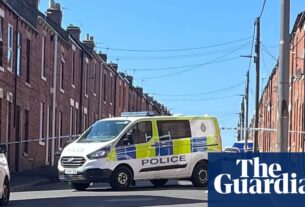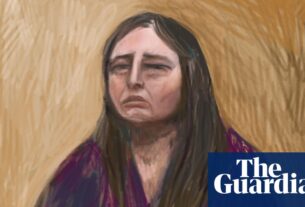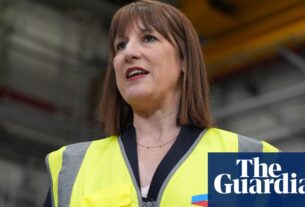King Charles called for a renewal of “global commitments to restoring a just peace where there is war, to diplomacy and to the prevention of conflict”, as the UK marked the 80th anniversary of Victory in Europe Day.
Westminster Abbey was the focal point for national commemorations with a service of thanksgiving weaving poignant reminders of wartime deprivation and loss with the hopes for the future that historic day had promised.
Senior royalty, politicians and military personnel joined 78 second world war veterans as the king led the nation in a two-minute silence at the start of the service. Across the UK, people stood in remembrance on a day that saw ceremonies held throughout Europe.
Later, speaking 80 years to the hour after his grandfather George VI’s 9pm address to the nation, Charles said the debt to those “whose firm resolve and fortitude helped destroy nazism and carry our allied nations through to VE Day” could “never truly be repaid”.
Addressing the VE 80 concert in Horse Guards Parade, which brought four days of commemorations to a close, he said that as the second world war generation “sadly dwindles”, there was a duty “to carry their stories forward, to ensure their experiences are never to be forgotten”.
Repeating Winston Churchill’s words that “meeting jaw to jaw is better than war”, he added we should “rededicate ourselves not only to the cause of freedom but to renewing global commitments to restoring a just peace where there is war, to diplomacy and to the prevention of conflict”.
He added: “For, as my grandfather put it: ‘We shall have failed, and the blood of our dearest will have flowed in vain, if the victory which they died to win does not lead to a lasting peace, founded on justice and established in goodwill.’”
Charles said: “It falls to us to protect and continue their precious legacy – so that one day hence generations yet unborn may say of us: ‘They too bequeathed a better world.’”
Charles also shared a diary entry written by his late mother, Queen Elizabeth II, on the day after VE Day, which read: “Out in the crowd again. Embankment, Piccadilly. Rained, so fewer people. Conga-ed into House. Sang till 2am Bed at 3am!”
He added, to laughter: “I do hope your celebrations tonight are almost as joyful, although I rather doubt I shall have the energy to sing until 2am, let alone lead you all in a giant conga from here back to Buckingham Palace!”
Among veterans in the royal box was 107-year-old Harry Richardson, a bomber pilot in the war. Films of other veterans, evacuees and those working on the home front, speaking of their experiences were played.
The concert included songs from the wartime era, a Dad’s Army sketch with Daniel Mays, Larry Lamb and Nigel Havers, Brian Cox as Churchill, rock bands The Darkness and Toploader, and singers Fleur East, Tom Walker and bass baritone Willard White.
Filmed reminiscences came from a trio of dames in Mary Berry, Joan Collins and Sheila Hancock.
Two Vera Lynn classics ended the show, with Calum Scott singing White Cliffs of Dover, and Samantha Barks with We’ll Meet Again.
Earlier, inside the abbey, the archbishop of York, Stephen Cottrell, used his address to say the hopes of VE Day and all the good that had come as the result of peace were being tested.
“Those first outpourings of joy on the first VE Day led to something good, because in our opposition of what was worst in us, we discovered what was best,” he added. “All this good is under threat again in our world today.”
But it was the veterans who were at the heart of the service. Some in wheelchairs, others leaning heavily on sticks, they were presented with white roses, signifying peace, handed to them by six young people.
It was a reminder that as time continues to claim first-hand witnesses to the war, the younger generation will shoulder responsibility for remembrance.
Echoes of the dark days of war were woven tightly into the order of service.
A “procession of witness” saw wartime artefacts from the armed forces and home front carried through the abbey on velvet cushions and carefully placed on the high altar: a D-day map, a set of campaign medals, a naval ratings cap, an RAF flying helmet, an air raid warden’s helmet, a child’s gas mask and a book recording the names of all the civilians killed across the UK.
Readings from wartime letters brought history alive.
One was from a frontline soldier, Fredrick Burgess, to his seven-year-old son, Freddie. It was written just seven months before the lance corporal was killed in action.
Another, from Janet Thornton to her teenage daughters on VE Day, urged them to remember the sacrifice and the importance of the day but also to “shout, scream, sing, wave flags, eat, drink – lemon or barley water – and make it a day of rejoicing”.
Her grandson, Colin Vallance-Owens, was in the abbey to hear her words. “She felt very, very seriously that this was a very, very important day for all of us,” he told the BBC.
An excerpt from Churchill’s 8 May radio broadcast from the Cabinet Office ricocheted off the abbey’s stone walls. His great-great-grandson, Alexander Churchill, 10, was given the honour of lighting the VE Day candle and read a prayer for “peace in Europe and across the world”.



